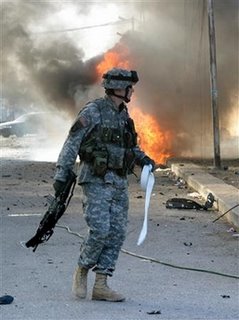
Washington's Wars and Occupations: Month in Review #11
March 23, 2006 By Max Elbaum, War Times/Tiempo de Guerras
BUSH ESCALATES IRAQ VIOLENCE AND THREATENS MORE WARS
On the third anniversary of the Iraq invasion, George Bush's Iraq policy is less
popular than ever before. The latest Newsweek poll shows approval at only 29%, compared
to 65% opposition. A first-ever poll of U.S. troops in Iraq shows 72% think the
U.S. should get out within the next year. Even conservatives and experts who once
backed Bush's war are jumping ship: the latest important defection came March 10
when New York Times reporter John Burns, back from another long period in Baghdad,
said he felt, for the first time, "that the American effort in Iraq will likely
fail."
Internationally, the administration is isolated. Members of the "Coalition
of the Willing" are one by one withdrawing from Iraq. Popular anger at the
U.S. is at record levels in the Middle East and across the globe.
Under the circumstances, one might guess that Washington would be looking for a
way to retrench. Conservative hawks like William F. Buckley, concerned about minimizing
the damage to U.S. imperial power, advise precisely that course: "The administration
has to cope with failure," Buckley writes. "Different plans must be made."
But Bush's response is: "Stay the Course - and More." The administration
is digging in to stay in Iraq indefinitely. It is escalating the use of violence.
It is threatening new military adventures and bullying from Iran to Venezuela to
Palestine.
NO PULLOUT, NO LETUP
Speaking to the press March 21, Bush made it absolutely clear there will be no pullout
from Iraq while he is President. Asked directly whether there would come a day when
no U.S. forces are in Iraq, he responded, ''That will be decided by future presidents
and future governments of Iraq.''
Less than a week earlier, General John Abizaid, U.S. commander in Iraq, sent the
same message. The U.S. "may want to keep a long-term military presence in Iraq
to bolster moderates against extremists in the region and protect oil supplies,"
Abizaid declared. Asked if this meant keeping permanent military bases in Iraq,
the general said he "could not rule that out." Two-weeks later, Abizaid
was rewarded with an extension of his tenure, making him the longest serving commander
in the history of the U.S. Central Command.
Meanwhile U.S. forces are escalating, not reducing, their use of violence. According
to an investigation published by Knight Ridder newspapers March 14: "A review
of military data shows that daily bombing runs and jet-missile launches have increased
by more than 50% in the past five months, compared with the same period last year.
Knight Ridder's findings were confirmed by Air Force officials in the region...
"The numbers also show that U.S. forces dropped bombs on more cities during
the last five months than they did during the same period a year ago... Stories
of American missiles hitting the homes of innocents are passed between Iraqi men
at teahouses and during Friday worship services. 'Residents worry that their homes
will be bombed at any time,' said Hussein Ali Jaafar, who owns a stationery shop
in the town of Balad, north of Baghdad, which was targeted by bombs or missiles
at least 27 times between October 2005 and February 2006. 'Most of the bombing is
unjustified and random. It does not differentiate between militants and innocent
people.'"
OCCUPATION FUELS SECTARIAN CONFLICT
These escalating U.S. tactics will fuel - not reduce - the deadly sectarian conflict
raging between Sunni and Shia armed groups. A must-read analysis by Michael Schwartz
at http://www.tomdispatch.com describes the ways U.S. policy has fostered sectarian
violence and makes the crucial point - not discussed in the U.S. media - that the
overwhelming bulk of armed attacks (80% on average) are against the U.S. military
and its Coalition allies, not against Iraqi civilians. The killing of civilians
by both Shiite and Sunni sectarian groups and militias is real and terrible, but
it is now being trumpeted by U.S. authorities as a justification for continuing
the U.S. occupation instead of being acknowledged as in large part a result of U.S.
occupation policies. Schwartz writes:
"All the conflicts of the present moment have metastasized and spread from
the ill-fated attempt by American-led forces to pacify Sunni communities... Today,
not only is the country edging toward an ever-more virulent civil war, but the Sunni
resistance is stronger than ever, registering about 100 attacks a day in January...
"This original war remains the central front in the ongoing battle for domination
in Iraq and it continues to cast off enough bitterness, suffering, destruction,
and rebellion to guarantee its never-ending spread to new areas and groups... If
the Americans sought to establish the legitimacy of the occupation by crushing early
signs of Sunni resistance, that effort has, in the end, only helped convince Iraqis
of the illegitimacy of the American presence. For all its failures, however, the
occupation has succeeded in one endeavor. It has managed to undermine all efforts
by other parties to establish their own legitimacy and therefore to build a foundation
for a new and sovereign Iraq. If one day Iraq ceases to be, splitting chaotically
into several entities, the way the occupation destroyed sovereignty (along with
parts of Sunni cities) will certainly come in for a major share of the blame."
PRE-EMPTIVE WAR, EXPANDING TARGET LIST
And it isn't just Iraq. The administration's newest National Security Document
officially repeats the so-called Bush Doctrine, in which Washington claims the right to
launch a preemptive war whenever it believes another country "might" threaten
the U.S.
The document targeted Iran as the most likely candidate for preventive war treatment.
"We may face no greater challenge from a single country than from Iran,'' it
said. Administration officials are keeping up the drumbeat of threats against that
country, even though Iran's nuclear program complies with the Nuclear Non-Proliferation
Treaty which Tehran has signed. Meanwhile Israel and India - nuclear powers which
have not signed the treaty - get the go-ahead from Washington for their nuclear
programs.
In a particularly worrying development, the Los Angeles Times reported March 21
that "U.S. intelligence officials...citing evidence from highly classified
satellite feeds and electronic eavesdropping, believe the Iranian regime is playing
host to much of Al Qaeda's remaining brain trust and allowing the senior operatives
freedom to communicate and help plan the terrorist network's operations. And they
suggest that recently elected President Mahmoud Ahmadinejad may be forging an alliance
with Al Qaeda operatives...The accusations echo charges that Bush administration
figures made about Iraq in the run-up to the U.S.-led invasion three years ago."
Of course Iran-Al Qaeda ties make little sense, since Al Qaeda is central to the
killing of Iraqi Shiites friendly to Iran and has denounced all Shiites, including
the Iranian leadership, as infidels. But the Bush administration did not let facts
get in the way of its previous war drive. There is no reason to expect more scruples
from them today.
Administration officials are also carrying over their demonization of Iran to
Venezuela. Secretary of State Condoleezza Rice told Congress last month that the U.S.
was using an "inoculation strategy" against alleged meddling by Venezuelan leader
Hugo Chavez. Rice called Venezuela a "sidekick" of Iran and the administration
upgraded their official assessment of Chavez' government as a "security threat."
BLANK CHECK FOR ISRAEL
Bush is also giving a huge blank check to Israel in its effort to forcibly impose
an illegal and unjust "solution" on the Israeli-Palestinian conflict.
On March 14 Israel brazenly violated an agreement it had signed (guaranteed by the
U.S. and Britain) by raiding a Palestinian prison in Jericho and seizing a number
of prisoners. Polls showed that even half the Israeli population believed the attack
was in part an electoral gimmick. The other part was a signal to the Palestinians
that the Israeli military will do what it pleases and that it has U.S. and British
support. Israeli peace activist Uri Avnery bluntly said:
"For a politician to send the army in to collect votes is an abhorrent act.
In this action, three people were killed. Many more lives, Palestinian and Israeli,
were put at risk....This is not the first time for [acting Prime Minister] Ehud
Olmert to walk over dead bodies on his way to power. As mayor of Jerusalem, he pushed
for the opening of a tunnel in the area of the Muslim shrines, causing (as expected)
dozens of casualties."
Despite Washington guaranteeing the Jericho prison agreement, the White House did
not utter a word of protest at the Israeli action. Nor did the Bush administration
object when Olmert openly discarded Bush's own "road map" for peace and
announced plans to unilaterally set Israel's borders with a huge annexation of
Palestinian land by 2010, using the route of the so-called "security fence" as his
guideline.
Israel's propaganda justification for such actions is the claim that it has "no
partner for peace." But even former U.S. President Jimmy Carter cut through
to the heart of the matter in a March 9 opinion piece, writing that "The preeminent
obstacle to peace is Israel's colonization of Palestine."
LATEST TORTURE REVELATION: "NO BLOOD, NO FOUL"
The New York Times reported March 19 under the headline "Before and After Abu
Ghraib, a U.S. Unit Abused Detainees":
"...in early 2004 an elite Special Operations forces unit converted one of
Saddam Hussein's former military bases into a top-secret detention center. American
soldiers made one of the former Iraqi government's torture chambers into their own
interrogation cell. They named it the Black Room. In the windowless, jet-black
garage-size room, some soldiers beat prisoners with rifle butts, yelled and spit in their
faces and, in a nearby area, used detainees for target practice in a game of jailer
paintball...Placards posted by soldiers at the detention area advised,
"NO BLOOD, NO FOUL." The slogan reflected an adage adopted by Task Force 6-26:
'If you don't make them bleed, they can't prosecute for it'... 'The reality is, there were no rules there,'
a Pentagon official said."
ALL OUT APRIL 29 & URGENT DEFENSE OF IMMIGRANT RIGHTS
Protest and mass pressure against all this is urgent. The next big moment for the
antiwar movement will be the March for Peace, Justice and Democracy in New York
City April 29, initiated by United for Peace and Justice, Rainbow/PUSH Coalition,
National Organization for Women, Friends of the Earth, U.S. Labor Against the War,
Climate Crisis Coalition, Peoples' Hurricane Relief Fund, National Youth and Student
Peace Coalition and Veterans For Peace. Go to http://www.april29.org for full
information.
The April 29 action includes a vital call to defend immigrant rights. New vicious
anti-immigrant legislation may be up for a vote in Congress next week. Contact the
National Network for Immigrant and Refugee Rights for background and action
information: http://www.nnirr.org or go to http://www.immigrantrights.org
War Times/Tiempo de Guerras is an all-volunteer project fiscally sponsored by the
Center for Third World Organizing. Donations to War Times are tax-deductible; you
can donate on-line at http://www.war-times.org or send a check to War Times/Tiempo
de Guerras, c/o P.O. Box 99096, Emeryville, CA 94662.

No comments:
Post a Comment